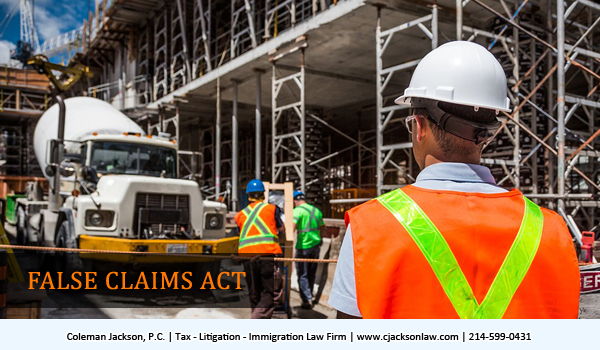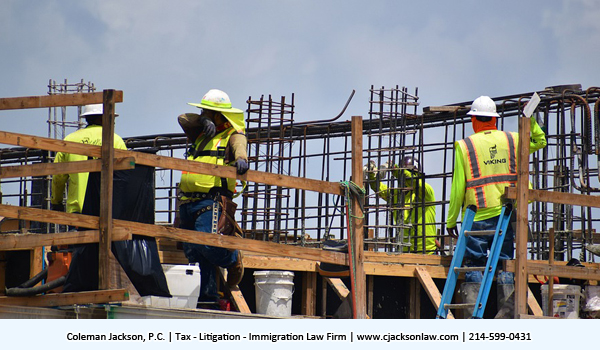By Coleman Jackson, Attorney & Counselor at Law & Certified Public Accountant
March 03, 2022
 The Latin term Qui Tam in plain English simply means a legal process by which an individual sues or prosecutes in the name of the government and shares in the proceeds of any successful litigation or settlement. The term individual could be an entity, a state, or a local governmental agency in the case of the federal government, or a natural individual. There are qui tam rights or proscriptions in numerous federal and state statutes. Texas and many other States for example have a False Claims Act. Also, there is a qui tam provision in the Internal Revenue Code proscribing that eligible individuals, as defined in the Code, is eligible to file a claim for award and to receive an award under Internal Revenue Code Section 7623 and U.S. Treasury Regulations Sections 301.7623-1 through 301.7623-4 (The Whistleblower Tax Claims). I am not going to talk about qui tam claims as it relates to Texas law or any other State’s law in this blog either. Watch our blogs because if our audience expresses an interest; we could, in the future, write a blog or do a podcast or video on qui tams in Texas. But for, a brief overview of federal taxation of qui tam awards in this blog; this blog is not about taxation, but it’s all about the qui tam proscriptions found in the federal False Claim Act, which can be found at 31 U.S.C. Sections 3729 through 3733 as expanded in 1986 and again in 2009. My focus with regards to qui tam in federal law is going to be limited even still because I’m talking about qui tam in public contracting only. This blog by no means intends to be exhaustive on this complex and arcane subject, nor do I make any attempt to review all of the statute where qui tam proscriptions can be found.
The Latin term Qui Tam in plain English simply means a legal process by which an individual sues or prosecutes in the name of the government and shares in the proceeds of any successful litigation or settlement. The term individual could be an entity, a state, or a local governmental agency in the case of the federal government, or a natural individual. There are qui tam rights or proscriptions in numerous federal and state statutes. Texas and many other States for example have a False Claims Act. Also, there is a qui tam provision in the Internal Revenue Code proscribing that eligible individuals, as defined in the Code, is eligible to file a claim for award and to receive an award under Internal Revenue Code Section 7623 and U.S. Treasury Regulations Sections 301.7623-1 through 301.7623-4 (The Whistleblower Tax Claims). I am not going to talk about qui tam claims as it relates to Texas law or any other State’s law in this blog either. Watch our blogs because if our audience expresses an interest; we could, in the future, write a blog or do a podcast or video on qui tams in Texas. But for, a brief overview of federal taxation of qui tam awards in this blog; this blog is not about taxation, but it’s all about the qui tam proscriptions found in the federal False Claim Act, which can be found at 31 U.S.C. Sections 3729 through 3733 as expanded in 1986 and again in 2009. My focus with regards to qui tam in federal law is going to be limited even still because I’m talking about qui tam in public contracting only. This blog by no means intends to be exhaustive on this complex and arcane subject, nor do I make any attempt to review all of the statute where qui tam proscriptions can be found.
Government contractor, be aware, the King has many eyes. Let’s look into qui tam and public contracting.
The False Claims Act and Public Contractor Code of Business Ethics and Conduct:
The False Claims Act permits a private person, known as a relator, to bring a qui tam civil action “in the name of the [Federal] Government,” 31 U.S.C. §3730(b), against “any person” who “knowingly presents… a false or fraudulent claim for payment” to the Government or to certain third parties acting on the Government’s behalf, §§3729(a), (b)(2). The Government may choose to intervene in the action. See §§3730(b)(2), (4). See Cochise Consultancy, Inc., ET AL. v. United States EX REL. Hunt (139 S.Ct. 1507(2019)).
(1) Federal Acquisition Regulation (FAR) Part 52.203-13 Code of business ethics and conduct prescribes that (1) “within 30 days after contract award, unless the Contracting Officer establishes a longer time period, the Contractor shall –
- Have a written code of business ethics and conduct;
- Make a copy of the code available to each employee engaged in performance of the contract;
(2) The Contractor shall –
- Exercise due diligence to prevent and detect criminal conduct; and
- Otherwise promote an organizational culture that encourages ethical conduct and a commitment to compliance with the law.
(3) (i) The Contractor shall timely disclose, in writing, to the agency Office of Inspector General (OIG), with a copy to the Contracting Officer, whenever, in connection with the award, performance, or closeout of this contract or any subcontract there under, the Contractor has credible evidence that a principal, employee, agent, or subcontractor of the Contractor has committed –
- A violation of Federal criminal Law involving fraud, conflict of interest, bribery, or gratuity violations found in Title 18 of the United States Code, or
- A violation of the civil False Claims Act (31 U.S.C. 3729 –3733).
Government Contractor beware, the King has many eyes. The Federal Acquisition Regulations (FAR) Part 52.203-14 requires that the Contractor display fraud hotline posters in plain sight at the contract work sites. Potential whistleblowers from company janitors to company leaders and from casual visitors to subcontractors are all around the work site by day and by night. Anyone with credible evidence may initiate a civil lawsuit. The relator receives a share of any proceeds from the action—generally 15 to 25 percent if the Government intervenes, and 25 to 30 percent if it does not—plus attorney’s fees and costs. See §§4730(d)(1)- (2). See also Vermont Agency of Natural Resources v. United States ex rel. Stevens, 529 U.S. 765, 769 – 770 (2000).
 What should public contractors and relators know about Qui Tam Awards and Taxes?
What should public contractors and relators know about Qui Tam Awards and Taxes?
Both relator and contractor must realize that False Claims Act recoveries tallies in the billions of dollars in the United States. Qui Tam federal tax fraud claims, on the other hand,may not be as costly or as numerous as claims under the FCA. Note that federal tax fraud claims are expressly exempted from the False Claims Act. See § 3729(d) of the FCA. As I mentioned at the top of this blog, the Internal Revenue Code, (IRC) contains special provisions and methods for whistleblower claims involving administration of the United States federal tax laws. Underpaying of tax and tax fraud awards to eligible whistleblowers are filed and handled pursuant to Internal Revenue Code §7623. Awards to eligible relators can range from 15 percent to 30 percent of the proceeds collected as the result of the judgment or settlement of the claim filed in the IRS Whistleblower Office. Arguably awards under the False Claims Act and Internal Revenue Code are taxable income to the relator or whistleblower and are none deductible losses to the wayward contractor or other violator; few exceptions might apply for certain types of expenses like attorney fees and other investigatory costs and trial costs paid in prosecuting the qui tam matter. See Reg. Sec. 1.61-2(a) __ qui tam payment is the equivalent of a reward or other income to the relator; and qui tam payments paid by a trade or business is none deductible under Internal Revenue Code Sec. 162(f).
Stay clear of anti-relator behavior– Relators and contractors or taxpayers should be represented by counsel in Qui Tam cases. Successful relators under the FCA are entitled to recover, in most instances, attorney fees, expenses and costs.Both the FCA and the IRC contain anti-discrimination provisions which can make the situation worst for alleged violators of the law if they handle the whistleblower situation badly either intentionally or unintentionally. Contractors and taxpayers alike should maintain tight internal controls, conduct lawful investigations and comply with all applicable laws. A lot of federal statutes—civil and penal;might be implicated in Qui Tam cases cautioning all involved to be represented and exercise due diligence. See 26 United States Code, Internal Revenue Code; 41 United States Code§4712, Whistleblower Protections for Contractor Employees;Title 48 of the Code of Federal Regulations, 48 CFR 1., The Federal Acquisition Regulations, which covers all federal procurement practices, including solicitations from small business concerns and small business teaming arrangements or joint ventures;Title 31 United States Code and §42121(b) of Title 49, United States Code, Protection of Employees; to reference only a few.
This law blog is written by the Taxation | Litigation | Immigration Law Firm of Coleman Jackson, P.C. for educational purposes; it does not create an attorney-client relationship between this law firm and its reader. You should consult with legal counsel in your geographical area with respect to any legal issues impacting you, your family or business.
Coleman Jackson, P.C. | Taxation, Litigation, Immigration Law Firm | English (214) 599-0431 | Spanish (214) 599-0432 | Portuguese (214) 272-3100


